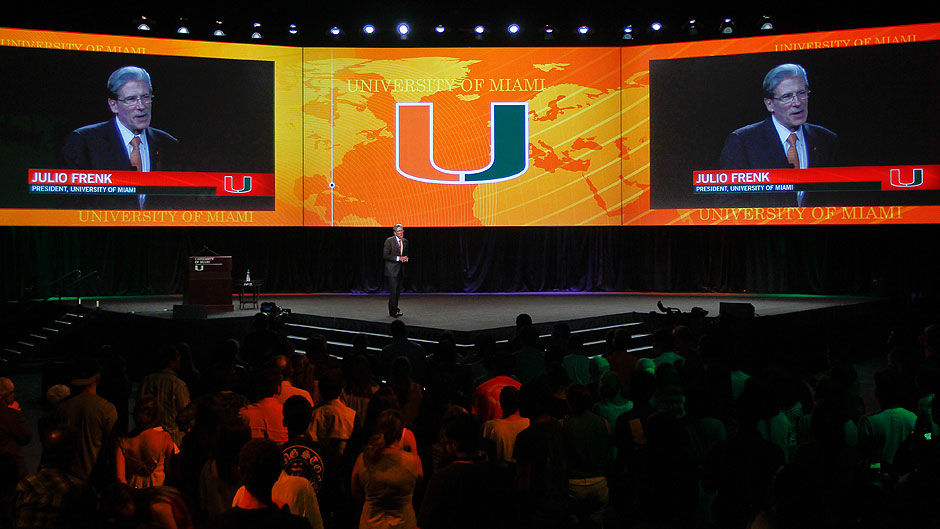They came from every corner of the U—students, scholars, and staff, scientists and supervisors, trustees and alumni—all of them gathering in one place to learn more about the future of the community they care so deeply about and the man tabbed to lead it to greater heights. And using a format popularized by political candidates during election season, new University of Miami President Julio Frenk gave them what they wanted while also lending an ear.
Frenk’s Town Hall Meeting at the BankUnited Center on Thursday allowed thousands in attendance and watching via live stream to get a clearer sense of the vision of UM’s sixth president and, if they were lucky to get their turn at the microphone, pose some of the questions that have been weighing on their minds ever since the former Harvard dean and minister of health of Mexico officially took office on August 16.
With a storied football program and five national championships a big part of UM’s legacy, the first question, submitted via Twitter, was, of course, related to that sport and what Frenk would do to help the Hurricanes become title winners once again.
“Make no mistake, I also like to win,” said Frenk, who went on to explain that the nation has many examples in schools such as Southern Cal and his own alma mater, Michigan, to demonstrate how academics and athletics can co-exist. He said that while he doesn’t have much skill in throwing or running with a football, his primary responsibility as UM’s president is to “ensure the success of our student-athletes on and off the field.”
When School of Communication alumnus Bryan Llenas, the national correspondent for Fox News Channel and reporter for Fox News Latino who moderated the Town Hall Meeting, opened up the floor for the live Q&A, eager UM students lined up 10 and 12 deep at two microphones, asking questions ranging from climate change to the LGBTQ community.
When asked how UM would help deal with the problem of rising sea levels, Frenk pointed to research and the importance of making sure knowledge generated by University scientists is translated into policy.
In answering a question on how he would make a UM education more accessible to students of lower economic status, Frenk noted that 58 percent of the University’s students receive some form of financial aid, and that part of his vision for the school is to ensure that financial barriers will not prohibit bright and intelligent students, who may be struggling financially, from obtaining an education at the private research institution.
On other issues, he noted that UM will offer gender-neutral housing starting in the fall of 2016, and he committed the University to becoming an example of diversity for others to follow, pointing to himself as the first Hispanic president of UM as an example of that diversity. His grandparents fled the horrors of Nazi Germany in the 1930s, fleeing to a country, Mexico, which, while lacking economic resources, was much richer in its tolerance for different cultures and groups.
He addressed how the University’s UHealth brand could be expanded, noting that UM’s medical and nursing schools and its affiliated hospitals constitute a “fantastic” academic health enterprise that could lead the way in the “amazing transformation of health care” in the country.
The Town Hall forum was the first public event of Frenk’s UM presidency. It was only five months ago that Frenk, sporting the colors of his new employer in the form of an orange and green tie, told a roomful of media at his introductory press conference that he would immediately begin a process of “immersion” to familiarize himself with the private research university he had just been chosen to lead. To carry out that process, he promised to listen and learn from as many sources as possible. Thursday’s Town Hall, held as Frenk entered only his fourth week on the job, was a major step in making good on that promise.
As such, he outlined for the audience the Listening Exercise initiative he has launched for his first 100 days in office. He described it as an intensive, immersive, and iterative listening project—one that invites students, faculty, and staff to share with him their aspirations and hopes for UM. A website -- miami.edu/listen -- has been launched where people can weigh in with some of their recommendations.
While Frenk is inviting the UM community to share their hopes for the U, he opened his Town Hall Meeting with a presentation that outlined his vision of a roadmap to UM’s second century. One of his primary messages: that with UM’s 100th birthday only a decade away, now is the time to prepare for its centennial and start building on what the institution should look like in the 21st century.
He also detailed his four major aspirations for the University: the pursuit of excellence in multiple areas including academics, service, the arts, athletics, and administration; achieving relevance in helping to solve the world’s most pressing problems; becoming a model for values such as diversity and tolerance; and becoming what he called “a force of integration across the Americas,” or specifically taking advantage of UM’s geographic location in greater Miami as a gateway to the world.
In the coming weeks, Frenk will be visiting UM’s schools and colleges and meeting with University leaders, students, donors, and trustees. Such efforts, he said, will set the stage for his presidential inauguration on January 29, 2016.
Frenk displayed a copy of UM’s approved charter from 1925, asking the audience to take note of Article IV, which said the University should have “perpetual existence.”
His roadmap for the future, he said, will help ensure UM continues to be a leader in the region, the country, and the world.
Share Your Ideashttp://miami.edu/listen

